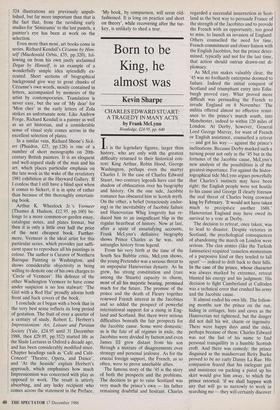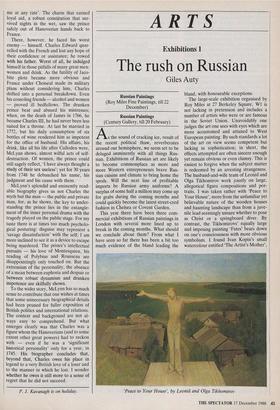Born to be King, he almost was
Kevin Sharpe
CHARLES EDWARD STUART: A TRAGEDY IN MANY ACTS by Frank McLynn
Routledge, £24.95, pp. 640
It is the legendary figures, larger than history, who are only with the greatest difficulty returned to their historical con- text: King Arthur, Robin Hood, George Washington, perhaps even the martyr Charles I. In the case of Charles Edward Stuart, two contrary legends have cast the shadow of obfuscation over his biography and history. On the one side, Jacobite romance has obscured him in Scotch myth. On the other, a belief (tenaciously endur- ing) in the inevitability of Jacobite failure and Hanoverian Whig longevity has re- duced him to an insignificant blip in the regular heartbeat of history. Now at last, after a spate of unsatisfying accounts, Frank McLynn's definitive biography shows Prince Charles as he was, and untangles history from legend.
From his very birth at the time of the South Sea Bubble crisis, McLynn shows, the young Pretender was a serious threat to an unpopular Hanoverian dynasty. As he grew, his strong constitution and (rare among the Stuarts) capacity to charm, most of all his majestic bearing, promised much for the future. The promise of the prince and the death of Fleury together renewed French interest in the Jacobites and so added the prospect of powerful international support for a rising in Eng- land and Scotland. But there were serious difficulties beneath the fair prospects for the Jacobite cause. Some were domestic: as is the fate of all regimes in exile, the Jacobites were divided by faction and even James III grew distant from his son through a mixture of disagreements over strategy and personal jealousy. As for the crucial foreign support, the French, as so often, were to prove unreliable allies.
The famous story of the '45 is the story of both the prospects and the problems. The decision to go to raise Scotland was very much the prince's own — his father remaining doubtful and hesitant. Charles regarded a successful insurrection in Scot- land as the best way to persuade France of the strength of the Jacobites and to provide the French with an opportunity, too good to miss, to launch an invasion of England. Others counselled the need for time, French commitment and closer liaison with the English Jacobites, but the prince deter- mined, typically and not for the last time, that action should outrun drawn-out di- plomacy.
As McLynn makes valuably clear, the '45 was no foolhardy enterprise doomed to failure. Indeed the initial conquest of Scotland and triumphant entry into Edin- burgh proved easy. What proved more difficult was persuading the French to invade England on 8 November. The militia offered almost no effective resist- ance to the prince's march south, into Manchester, indeed to within 120 miles of London. At Derby, however, General Lord George Murray, for want of French or English assistance, counselled a retreat — and got his way — against the prince's inclinations. Because Derby marked such a turning point not only in the '45 but in the fortunes of the Jacobite cause, McLynn's new analysis of the possibilities is of the greatest importance. For against the histor- iographical tide McLynn argues powerfully that Charles' instincts may have been right: the English people were not hostile to his cause and George II clearly foresaw the real threat of Charles being crowned king by February. 'It would not have taken much to precipitate another 1688.' Hanoverian England may have owed its survival to a vote at Derby.
The decision to retreat, once taken, was to lead to disaster. Despite victories in Scotland, the psychological consequences of abandoning the march on London were serious. The clan armies (like the Turkish Janissaries) required 'ceaseless momentum of a purposive kind or they tended to fall apart' — indeed to drift back to their hills. In the case of the prince, whose character was always marked by extremes, retreat blunted his energy and his judgment. His decision to fight Cumberland at Culloden was a technical error that crushed his army and the Jacobite cause.
It almost ended his own life. The follow- ing months saw the prince on the run, hiding in cottages, huts and caves as the Hanoverian net tightened, but the danger did not dull his wit, charm or ingenuity. There were happy days amid the risks, perhaps because of them: Charles Edward was not the last of his name to find personal tranquillity in a humble Scottish croft. And there was comedy: the prince disguised as the maidservant Betty Burke proved to be no early Danny La Rue. His companion feared that his inelegant gait and insistence on packing a pistol up his skirt would give him away, to which the prince retorted: 'if we shall happen with any that will go so narrowly to work in searching me — they will certainly discover me at any rate'. The charm that earned loyal aid, a robust constitution that sur- vived nights in the wet, saw the prince safely out of Hanoverian hands back to France.
There, however, he faced his worst enemy — himself. Charles Edward quar- relled with the French and lost any hope of their confidence or assistance; he rowed with his father. Worst of all, he indulged himself in those pitfalls of many great men: women and drink. As the futility of Jaco- bite plots became more obvious and France under Choiseul made its military plans without considering him, Charles drifted into a personal breakdown. Even his consoling friends — alcohol and women — proved ill bedfellows. The drunken prince beat and abused his mistresses; when, on the death of James in 1766, he became Charles III, he had never been less suited for a throne. At last he married in 1772, but his daily consumption of six bottles of wine rendered him as impotent for the office of husband. His affairs, his drink, like all his life after Culloden were, McLynn shows, almost wilful acts of self- destruction. Of women, the prince could still sagely reflect, 'I have always thought a study of their sex useless'; yet for 30 years from 1748 he debauched his name, his judgment and his cause with them.
McLynn's splendid and eminently read- able biography gives us not Charles the myth but the man — the public and private man, for, as he shows, the key to under- standing the prince lies in the entangle- ment of the inner personal drama with the tragedy played on the public stage. For my taste there is at times too much psycholo- gical posturing: disguise may represent a 'savage dissatisfaction' with the self; I am more inclined to see it as a device to escape being murdered. The prince's intellectual pursuits — his love of Montesquieu, his reading of Polybius and Rousseau are disappointingly only touched on. But the extremism of the personality, the absence of a mean between euphoria and despair or between robust dynamism and drunken impotence are skilfully shown.
To the wider story, McLynn has so much sense to contribute that one wishes at times that some unnecessary biographical details had been pruned for fuller exposition of British politics and international relations. The context and background are not al- ways easy to comprehend. But what emerges clearly was that Charles was a figure whom the Hanoverians (and to some extent other great powers) had to reckon with — even if he was a 'significant historical personality' only for a year, in 1745. His biographer concludes that, beyond that, Charles owes his place in legend to a very British love of a loser and to the manner in which he lost. I wonder whether he owes it still more to a sense of regret that he did not succeed.
P. J. Kavanagh is on holiday.



























































 Previous page
Previous page